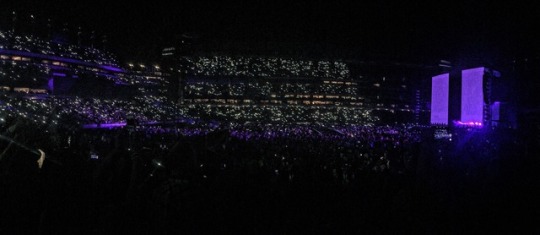Text
Music + Morgan
There are a million different versions of me that people have conjured up in their minds. Honestly, I try extremely hard to be those million different versions of myself. It drives me absolutely insane, but being the people pleaser that I am I've kept this going for as long as I can remember. I can be the social me, I can be the “idgaf me”, I can be any version of myself that people want me to be. My mind is constantly trying to figure out how not to go completely insane everyday. There really is only one place where I feel my mind quiet and I settle into the true version of myself, it's when I'm listening to music.
My music is me. Scrolling through my Spotify library someone I've known do years could discover things they otherwise would have never known. The emotions that I keep hidden can be found in songs that are most insignificant to the majority of my generation. My sanity would be at risk if I didn't have music. Everyone assumes that I'm the happiest and most chill person, that just completely untrue. I don't talk about my feelings because that's not the me that people want to see, so I turned to music. Back in the 4th grade I moved to Delaware, also know as the "Hell State". I was miserable and had zero friends my getaway was sneaking downstairs to watch MTV music videos. Those moments with just me and music somehow saved 10 year old me and it's been the same since. Whenever I can't get out everything that's bottled up inside of me I just pop in my earphones and play a song that will help me release everything that I'm incapable of releasing on my own. I can't even begin to count how many times I've sat in my room crying to Joni Mitchell or Fleetwood Mac. Music taps into my true self. It feels so good to just plug in and suddenly be free. Music is me.
0 notes
Text
Music + Gabi
I cannot remember a time in my life where there where music hasn’t played a big role. When I was little I heard a mixture of The Partridge Family Album, classic cuban music, new wave 80s music, Harry Belafonte, my sister’s rock, and whatever top 40 was playing on the radio. I’ve always loved to dance, whether that be in classes or outside of them, whenever the music moved me. I started playing viola in the fourth grade - orchestra turned to choir in the 7th. I picked up ukulele in the 8th, and started doing musicals in high school.n Meanwhile I started developing my own taste, which has ranged from pop to indie, alternative, R&B, and EDM. Music is constantly there, in fact I get uncomfortable in silence.
I have found music to be more than background noise though. Music is a voice that can express what I cannot. Music is a friend that listens to feelings I don’t trust with anyone else. Music has been there when I thought there was nothing left. Music has told me to keep hanging on when I wanted so badly to just give up.
Though I usually appear as a positive person, and for the most part look at life with an optimistic lens, I have struggled with my mental wellness. A band called Twenty One Pilots has a particular accuracy in describing mental health issues. Before listening, I was so afraid of talking about it, and I honestly felt so alone. Then I heard them and for the first time I felt like there were people out there who understood exactly what I was feeling. They gave me the strength to not be ashamed and to get help. They also gave me hope in a better tomorrow. A lyric from one of their songs, Car Radio, tells the listener that “Peace will win and fear will lose”. Seven words can mean so much to someone who thinks they will forever be stuck in a rut. In a way, music has been my medicine.
On the other side of the spectrum, music has always been there for me in my good times. I connect songs with memories, events, seasons, and times in my life. For example, Send Me On My Way by Rusted Root will always be the song my brother graduated to and my mom’s pain of seeing him grow up. Story Of My Life will forever remind me of the autumn of 2013. The Beach Boys reminds me of my pointe ballet class. Ed Sheeran reminds of the two concerts I went to with one of my best friends. Waves by Kanye West reminds me of midnight car trips to the beach, driving with the windows down. Greenlight is the time I tasted my future. First Day of my Life reminds of someone I wish to forget; Young Dumb & Broke reminds me someone I’ll always remember.
I will be studying neuroscience next year, and while it feels like there’s a deep connection with music and my soul, it’s interesting finding out the myriad of scientific reasons as to why it has such a profound effect on me. Cheesy as it is, I couldn’t imagine my life without my dear friend, music.
1 note
·
View note
Photo
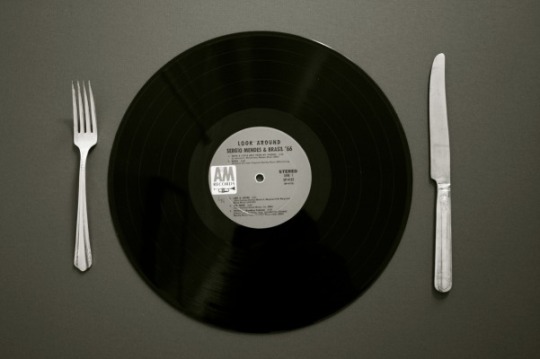
How do we develop our taste in music?
A study published in the journal Science suggests that patterns of brain activity can indicate whether a person likes what he or she is hearing. An area in the brain called the superior temporal gyrus is intimately involved in the experience of music, and is connected an area in the brain called the nucleus accumbens, which is involved in forming expectations. The genres of music that a person listens to over a lifetime impact how the superior temporal gyrus is formed. It doesn't alone predict whether a person likes a given piece of music, but it's involved in storing templates from what you've heard before. This means that the more you listen to indie rock, the more likely you are to like the indie rock music you listen to in the future. Researchers could also judge how much people were willing to pay for a song based on the amount of activity in the nucleus accumbens.
0 notes
Photo
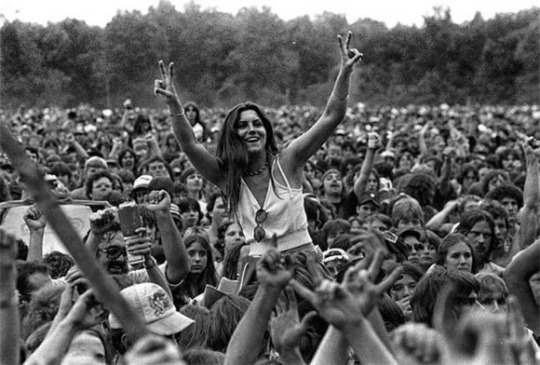

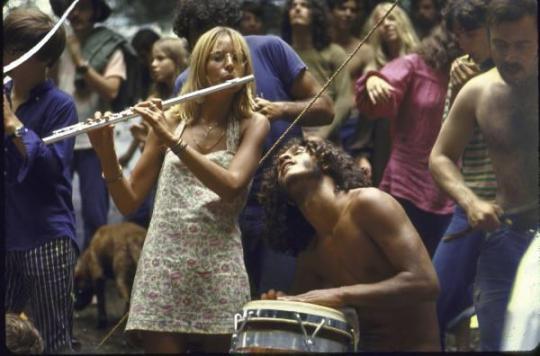
The Neuroscience Behind Bonding Through Music
Music gives us an oxytocin boost.
Oxytocin is a neurotransmitter, also known as “the love hormone”, due to its release during events such as sharing a kiss with a partner, hugging a loved one, or even breastfeeding. Is known to play an important role in increasing bonding and trust between people. Researchers have found that singing and listening leads to higher levels of oxytocin after the fact, which, in turn, affect our ability to trust and act generously toward others—factors that increase our social connection. This could explain why mothers choose to sing to their newborns, or couples feel something special when they listen to “their song”, and also why people might feel closer after making music or going to a concert together.
Music increases contact, coordination, and cooperation with others.
Anybody who has ever played in an band, orchestra, or choir or has performed in a dance recital or musical knows that it takes a huge amount of hard work with others in order to succeed. Musicians need to coordinate many efforts so that things like rhythm, harmonization, dynamics, and synchronization are exactly how they have to be; when they do synch up there is a clear positive social connection shared within the group. Though it’s unclear exactly why that happens, coordinating movement with another person is linked to the release of pleasure chemicals (endorphins) in the brain, which may explain why we get those positive, warm feelings when we make music together.
Music strengthens our ”theory of mind” and empathy
The “Theory of Mind” circuit is a part of the brain that is used when people try to understand the thoughts, emotions, and beliefs of others - a key to empathy. Using a functional MRI, neuroscientists have observed that the ToM circuit is actually used when people listen music. This means that our brain doesn’t just process sound when we hear music, but instead tries to understand the intent of the musician and what’s being communicated. Exposure to music has also been found to increase the empathy skills of children (as compared to children who were exposed to dramas or story telling).
source: http://greatergood.berkeley.edu/article/item/four_ways_music_strengthens_social_bonds
0 notes
Photo
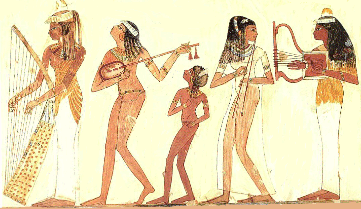

“Bone flutes have been dated to about 40,000 to 80,000 years ago, so people were at least playing music. Experts assume that people were probably singing before they went to the trouble of fashioning this instrument, Levitin said. In Judaism, the Torah was set to music as a way to remember it before it was written down” “before there was writing, used music to help them remember things, such as how to prepare foods or the way to get to a water source. These procedural tasks would have been easier to remember as songs. Today, we still use songs to teach children things in school, like the 50 states and ABCs.”
source: http://www.cnn.com/2012/05/26/health/mental-health/music-brain-science
0 notes
Photo
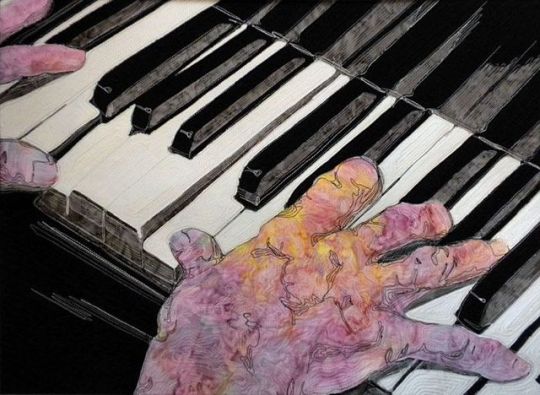
Musical Muscle Memory
Musicians who try to memorize a song do so by practicing, or strengthening the neural circuits in the specific motor-action plan. A motor action plan means that a particular series of motor functions, like the movement of your fingers, must unfold to achieve a particular goal, aka correctly perform a piece of music. In order to achieve this goal you must start with specific sequence of motor functions, like a password to unlock the rest of your muscle memory. This is why musicians can’t often start in the middle of a piece from memory, or why you might need to sing the entire alphabet in order to find what comes after “Q”.
source: http://www.cnn.com/2012/05/26/health/mental-health/music-brain-science
0 notes
Photo
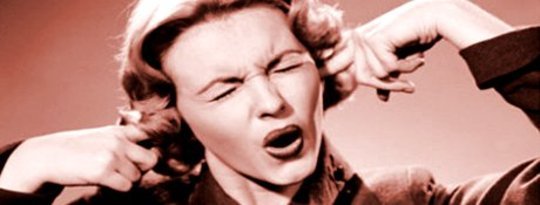
Why do songs get stuck in our head?
Earworms are still not completely figured out, but segments of songs get stuck in your head because neural circuits get “stuck” in a repeating loop.
Most ear worms have the same characteristics: short and simple segments, repetitive notes, and distinctive rhythms.
You are more likely to get earworms if you’re more of a musical person.
When you have a song stuck in your head the auditory cortex — the part of the temporal lobe that processes sound — was involuntarily activated.
source: http://www.livescience.com/58120-why-songs-get-stuck-in-head.html
0 notes
Text
20 surprising health benefits of music
Help Physically
1. Ease pain.
2. Motivate people to bike harder.
3. Improve running motivation and performance.
4. Increase workout endurance.
5. Speed up post-workout recovery.
6. Improve sleep quality.
7. Help people eat less.
8. Enhance blood vessel function.
Help Mentally:
9. Reduce stress.
10. Induce a meditative state.
11. Relieve symptoms of depression.
10. Induce a meditative state.
11. Relieve symptoms of depression.
12. Elevate mood.
13. Improve cognitive performance.
14. Help people perform better in high-pressure situations.
15. Reduce anxiety as much as a massage.
16. Relax patients before surgery.
17. Ease stress after surgery.
18. Elevate mood while driving.
19. Help cancer patients manage stress and anxiety.
20. Ease recovery in stroke patients.
source: https://www.usatoday.com/story/news/health/2013/12/17/health-benefits-music/4053401/
0 notes
Text
How does music move through your brain?
Sound waves first arrives to the middle ear, also known as the ear drum, and then to the inner ear. Here, the cochlea converts the sound wave vibrations to a electrical neural signal which is then carried to the rest of the brain through the auditory nerve. The signal follows a pathway that travels arround the brain until it reaches the auditory cortex, where the brain finally makes sense of the signal.
Neural Rewards of Music
Daniel Levitin looks to cognitive neuroscience to help explain why music is so important to us. According to Levitin, “The story of your brain on music is the story of an exquisite orchestration of brain regions, involving both the oldest and newest parts of the human brain.”
Listening to music activates many particular brain regions in a certain order: “first, the auditory cortex for initial processing of the components of the sound. Then the frontal regions…previously identified as being involved in processing musical structure and expectations. Finally, a network of regions — the mesolimbic system — involved in arousal, pleasure, and the transmission of opioids and the production of dopamine, culminating in activation in the nucleus accumbens. The rewarding and reinforcing aspects of listening to music seem, then, to be mediated by increasing dopamine levels in the nucleus accumbens”
0 notes
Video
As Americans began to rebuild after the September 11 terror attacks, music made those difficult times easier to get through. Learn more on the original series
0 notes
Video
During the Vietnam War, popular music was essential for American soldiers trying to survive
0 notes
Photo
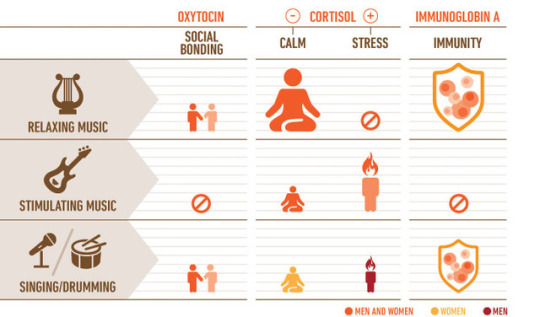
Music is proven to significantly reduce anxiety. patients before surgery have less stress hormone (cortisol) after listening to music than people who took anti anxiety drugs.
Source: http://www.cnn.com/2013/04/15/health/brain-music-research/
0 notes
Text
Why music makes us feel
“It is suspected that mirroring and resulting emotional contagion does not only happen between people but also during music listening. It sounds quite incredible, but it is possible that emotional expression in music could also be mirrored by the brain and then give rise to the corresponding emotional state in the listener. For instance, music could be perceived as sad because of the commonalities it has with the prosody of sad speech (low pitch, low volume, slow, dark timbre”
Source: http://syncproject.co/blog/2015/7/21/music-and-emotion
0 notes
Text
An Introduction
How does music affect people?
As music lovers, we decided to do our senior legacy project on this question. Morgan will be focusing on the social and emotional aspects on the effects of music, while Gabi will be focusing on how music affects the brain. We hope you enjoy!
0 notes


